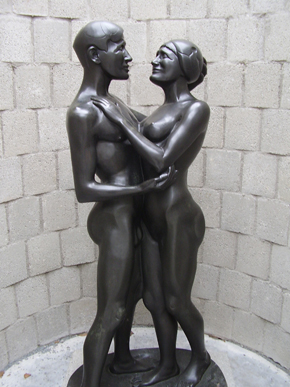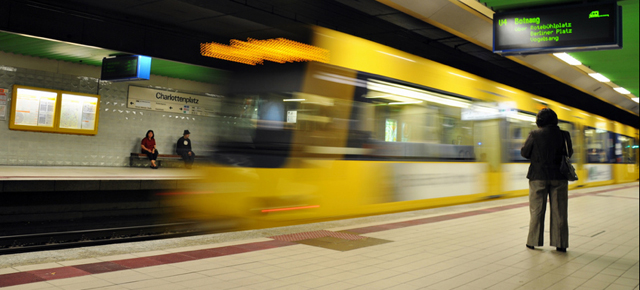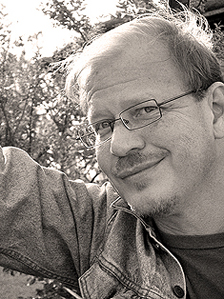Platform two
by Ricardo Waale
Liefde (1917) by Joseph Mendes da Costa, Kröller-Müller Museum sculpture garden, Netherlands. ‘Alpha.prim’/Wikimedia Commons
In the course of a life everything is forgotten. I’m certain (though completely unconcerned) that the suicide which took place last Tuesday the fourth of February at 10:23 pm on platform two of Charlottenplatz station in the Stuttgart metro was only investigated for a couple of days: one more number for the statistics and the macabre consolation that such things happen more frequently in, for example, Berlin. However, it’s quite natural that this event still remains fixed in my memory, basically because of the mystery surrounding the reason why it happened.
That night, as far as I was concerned, I knew I would never again experience the coming and going of the trains on the subterranean rails. In fact, I wouldn’t even enter a metro station. And this despite having always been fascinated by that turbid world of catacombs, the arcane nature of its network of caverns and the sudden darkness which impedes us from discovering the reality of certain alcoves we see, fleetingly, from the moving carriages.
What’s more, I was deeply struck by the sordid appearance of some specific stations, with the debauched, pitifully tender atmosphere conferred by the presence of drunks and tramps, and the eternal lunatics who seem to be fleeing from the sun to take refuge on the platforms under the mean fluorescent lights and the disparaging glances of ordinary passengers, their fitful, meaningless interjections, short bursts of hysterical laughter, sadness and prolonged silences. The hopeless failure of the violent garb of the punks, which, in the end, doesn’t seem to frighten anyone. The masks normal citizens assume on entering the metro and their grotesque, glassy gazes, actively alert during the unsettling wait for the train and lost to indifference on entering the carriages. The mutual contempt of the young and old. The weary, vacant expressions of the workers. The bold coquetry of certain girls; and the occasional words of excuse which dignify a journey in the suffocating crush of the rush hour.
Not to mention those indisputably strange emanations which issue from metros, some so suspect that those sensitive to ancient, invisible life forms swear to experiencing an icy, oppressive sense of danger. Nevertheless, I always liked travelling by metro; and if I don’t do so any more, I repeat, it’s due to that fatal accident on platform two of Charlottenplatz.
I’ve witnessed violent situations in underground networks, but never the triumph over human life – what I then understood as death – much less a suicide. I remember that once, on a platform of the Gare d’Austerlitz metro station, in a state of complete catalepsy, I watched a bloody fight between two irate, middle-aged men from Marseilles. In Torre Arias I saw a girl tumble down the steps while an older woman roundly insulted her in a virulent Spanish, the like of which I’d never heard before; and in New Cross Gate I got a knife wound for becoming involved in an altercation between a hooligan and an officer of Scotland Yard. But the Stuttgart metro – in comparison with others – is a tribute to order and efficiency; and even, to continue the comparison, to decency. A metro, to my mind, far from causing exasperation or intensifying earlier traumas. Why, then, that suicide which upset the comfortable monotony of Charlottenplatz’s platform two? If I’m writing this report, it’s in the scant hope that it can help me to identify the motive for that event which changed my entire existence.
It’s my anonymous opinion that there was perhaps no motive at all. I’m aware that there’s something ominous about the yellow line bordering the edge of the platform, something which represents a frontier between life and its end, and it’s for that reason alone that the loudspeakers so insistently advise you to stand well back. In the past, when I travelled on the metro, I was sporadically assailed by the crazy idea of throwing myself across the yellow line. It appeared as a passing notion which simultaneously amused and terrified me. I never attached much importance to it as I imagined I shared the idea with any other metro user, just as when flying we consider the possibility of the plane blowing up or falling out of the sky. Moreover, I frequently used to harbour such thoughts (until that fateful fourth of February) due to an uncommon interest in the concrete fact of what we term death; without implying, of course, any antipathy towards life. I don’t know how the intensity of love for life could be measured, but I always considered myself to be happily enamoured of it in every known sense: the wonderful miracle but also the implicit suffering, on the best of days and the worst, in good times and bad… Is not this attitude the ultimate essence of love? But now everything is so inexplicably different.
In the Café Stella, via a friend, I met Sabine for the first time. Although her date was with him, she seemed just right for me. I’ve always liked slim, blonde women who wear black.”
I remember that as I boarded the train in Staatsgalerie, at around 7:30 on the evening of the accident, I was filled with a disconcerting sense of joy and optimism. I attributed this to the pleasure I’d just experienced during a beautiful talk on Marc Chagall, a species of poetic ritual performed by genuine admirers and not one of those self-indulgent speculations of an intellectual ilk, so frequent at previous meetings. I got out early at Rathaus to walk along Konrad Adenauer Straße to the Café Stella, and so enjoy the cold of a winter which, up until then, had been a fiasco.
In the Café Stella, via a friend, I met Sabine for the first time. Although her date was with him, she seemed just right for me. I’ve always liked slim, blonde women who wear black. We hit it off at once and then – while we were exchanging bits and pieces of information – my friend decided to break up our mutual absorption, showing us a sheet of paper half-covered with physics formulae, and proudly saying that he’d spent four hours working on that problem alone. Sabine smiled and I told him that with four hours more, he could well cover the whole page. Then we spoke about the city and its meagre repertoire of alternative venues like the Café Stella, and about Freiburg, which, though smaller, was more generous in this sense. My friend and I ordered beer and Sabine asked for an Amaretto and a glass of Sekt, so we made fun of her refined tastes; it was then – through a vindictive aside from my friend – that I learnt that this enchanted princess worked as a waitress in the Café St Gils. At first I couldn’t place it, but then I remembered a decadent morning I’d spent there with a group of architects, which I shall recall in search of some clue.
They were celebrating the final day of a conference on Venice: an ending which was a veritable relief for me since some of my friends were beginning to metamorphose into unbearably repellent, pedantic insects; and if I accompanied them in that epilogue, it was simply because there are situations which solidarity prevents us from avoiding. So I was forced to endure, with the patience of a saint, a long-winded, opinionated speech from a certain Mona, who had an unpleasant little turned-up nose which made me think of the unfortunate coincidence linking that particular feature with wealthy families. Mona obliged us to listen to a string of quotations from Shakespeare, Hemingway and Thomas Mann in order to make it perfectly clear that she, more than anyone else, had read a lot about Venice. At which point the old saying about a silk purse and a sow’s ear occurred to me. Next came some pretentious comments about the urban rhythm of Venice from someone called Stephen, smoking his pipe despotically in crude imitation of an improbable, anachronistic Mies van der Rohe. I felt indignant that Sabine, with her lovely, Ingrid Bergmann face, might have to serve such stupid people. She hadn’t been there that day; I’d have remembered her. My friends, on the other hand, showed discretion, and if they opened their mouths at all, it was just to order the bottles of Sekt to accompany the breakfast. This eccentricity – having bubbles with breakfast – somehow amused me, perhaps because it made me relive analogous but enjoyable events: a roadside breakfast en route from London to Southampton with my antiquarian friends Esther and Paul; or that sunrise (or jet-set, as we called it) birthday party given by an eccentric lady who lived in the Cerro el Ávila, to which respectable personalities arrived by helicopter while my sister and I turned up filthy and on foot after our car got stuck in the mud. Such memories helped me to get through that morning, but I never again returned to the Café St Gils, and had practically forgotten it.
“Yes,” said Sabine, “it is a very snobby place, but you have to earn a living…”
The truth is that, in gaining the favour of Sabine, I was winning the enmity of my friend. I took my leave:
“Of course, Sabine… See you in the Café St Gils!”
As I was descending to the platforms at Österreichischer Platz, I was filled with the joyful knowledge that I was falling in love. I lit a cigarette and stubbed it out immediately on the arrival of the number fourteen train for Heslach at 10:15 pm. I enjoyed the journey, thinking tenderly of Sabine, imagining her among a fantastic group of winged mermaids, donkeys floating in the air, cocks on rooftops and flowers, lots of flowers. Sabine and Chagall.

Charlottenplatz station (detail) by Jaime Silva, via Flickr
Feeling ecstatic, I got off the train at 10:20 on platform two of Charlottenplatz. Three minutes later I should have changed (needless to say, it was impossible) to the number five to Stammheim, and then disembarked at Türlenstraße, my local station. I was glad to be on my way home and it always amused me to hear the announcement for the station, perhaps because it achieved amazing, almost festive, shades of courtesy. I used to silently repeat those words from memory in unison with the recorded voice when I was travelling alone, and aloud when I was in company, dying of laughter:
Türlenstraße – Bürgerhospital
Richtung: Killesberg – Messegelände
Bitte, Umsteigen!
At home, a friend would be waiting for me to share a very personal date, the anniversary of something that had happened in London exactly twelve years before, on the escalators of Notting Hill Gate station: I was going down, she was coming up. Nothing extraordinary, just a matter of turning round and going back, thinking what to say, that sort of thing. I was amused that this friend had remembered the date and was kind enough to accompany me on that first fourth of February I would never again spend with Paula. I shouldn’t have told her about it, I now think. However, I’ve ruled out the possible interference of that indiscretion in the situation I’m now trying to clarify.
Of those of us who got off at Charlottenplatz, none were able to change trains. After the suicide, they immediately closed the entrance to the station and hurried along the people who were exiting. In the crowd, I managed to hear that it was the second time so far that year. That surprised me. After all, according to statistics, such accidents happen more frequently in, for example, Berlin. I also heard, among speculations on the pain of the body hitting the train, that it had been a direct blow and, therefore, the person had died instantaneously. Observant witnesses (I was so distracted…) stated that the impact had caused the body to somersault into the air before falling on the platform.
Then I felt dizzy. Afterwards, I recovered and could also see the body. I was surprised by its position, so like a child in the womb, and as there were no wounds, it seemed amazing that that body was dead. It looked more like a man who had inconveniently fallen asleep on platform two. Then, as the police surrounded the corpse, my attention was again distracted by thoughts of a Chagall painting, from the Hermitage in St Petersburg, in which a serene young woman in a field is waving at the distant figure of a man among a fantastic group of winged mermaids, donkeys floating in the air, cocks on rooftops and flowers, lots of flowers. That’s all I can remember.
In the course of a life everything is forgotten. I’m certain (though completely unconcerned) that the suicide which took place last Tuesday the fourth of February at 10:23 pm on platform two of Charlottenplatz station in the Stuttgart metro, was only investigated for a couple of days: one more number for the statistics and the macabre consolation that such things happen more frequently in, for example, Berlin. However, it’s quite natural that this event still remains fixed in my memory, basically because of the mystery surrounding the reason why I crossed the yellow line and threw myself into the void.
Translated by Christina MacSweeney. First published in English by The Drawbridge, December 2012.

Author portrait © Elizabeth Coronado
Ricardo Waale was born in Caracas in 1959 to Norwegian and Venezuelan parents. Having obtained a degree in architecture from the Universidad Central de Venezuela, he studied postgraduate courses in landscaping at the Universität Stuttgart and the Royal Botanical Gardens, Kew. He is the author of the short-story collection Memorias en la laguna and Libros de Caracas – essays about some of the most emblematic books on the city. His work has also appeared in many anthologies and literary magazines.
Christina MacSweeney has an MA in Literary Translation from the University of East Anglia. She has translated a number of works by Ricardo Waale including ‘A Special Day’, which was chosen for Booktrust’s Story campaign in 2009. Her translation of Valeria Luiselli’s novel Faces in the Crowd and essay collection Sidewalks are published by Granta Books, and her work has appeared in Words Without Borders, Litro, The Drawbridge and Brick magazine, among others. In 2013 her translation of a collection of essays by the Paraguayan art critic Ticio Escobar, The Invention of Distance, was published by AICA/Fausto Ediciones.

